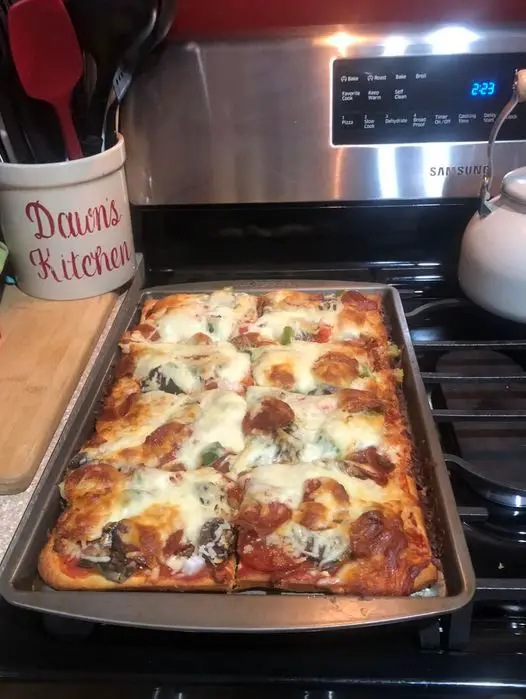In the realm of culinary creations, the quest for quick, delicious, and satisfying meals often leads to the innovative use of readily available ingredients. Enter the crescent roll pizza: a game-changer in the world of homemade pizzas. This delightful twist on the traditional pizza uses crescent roll dough as its base, offering a flaky, buttery crust that’s both easy to prepare and irresistibly tasty. It’s a testament to the creativity of home cooks who dare to reimagine classic dishes in new and exciting ways.
The Rise of the Crescent Roll Pizza
The crescent roll pizza is more than just a recipe; it’s a culinary hack that speaks volumes about modern cooking trends. In a time when convenience is prized, this recipe stands out for its simplicity and versatility. By substituting traditional pizza dough with crescent roll dough, it eliminates the intimidation and time commitment often associated with homemade pizza, making it an accessible option for cooks of all skill levels.
Ingredients at a Glance
At the heart of this dish are the humble crescent rolls, transformed into a pizza base that’s both innovative and inviting. The addition of garlic powder-infused olive oil, rich pizza sauce, melty mozzarella cheese, and a variety of toppings creates a symphony of flavors that elevate the crescent roll from a simple pastry to a star component of the meal.
The Culinary Adventure Begins
Creating a crescent roll pizza is an adventure in flavor and creativity. The process begins with rolling out the dough on a baking sheet, followed by a generous brush of garlic-infused olive oil, setting the stage for the layers of taste that follow. The application of the sauce and toppings is where personal preference plays a pivotal role, allowing each cook to tailor the pizza to their liking.
A Canvas for Creativity
One of the most appealing aspects of the crescent roll pizza is its potential for customization. From the choice of sauce to the selection of toppings, it invites experimentation and personal expression. This section of the article would delve into various ways to customize your pizza, suggesting combinations that range from classic to unconventional, catering to a wide array of taste preferences.
Healthier Alternatives
In response to a growing interest in healthier eating, the crescent roll pizza can be adapted to fit various dietary needs. This part of the article could explore alternatives such as using reduced-fat crescent rolls, plant-based cheeses, and an abundance of fresh vegetable toppings, demonstrating that indulgence and well-being can coexist on the same plate.
The Social Aspect of Food
Beyond its taste and convenience, the crescent roll pizza embodies the social aspect of food. It’s a dish that brings people together, whether it’s through the shared experience of cooking or the joy of gathering around the table to enjoy the fruits of one’s labor. This section would reflect on the role of food in fostering connections and creating memories, highlighting how dishes like this can be a catalyst for meaningful interactions.
A Global Perspective
Expanding on the idea of pizza as a universally loved dish, this part of the article would take a global perspective, examining how pizza variations reflect cultural differences and similarities. It would underscore the crescent roll pizza’s place within this rich tapestry, celebrating the diversity of culinary traditions and the ways in which they converge in our globalized world.
Frequently Asked Questions about Homemade Crescent Roll Pizza
Can I use any type of crescent roll dough for this recipe?
Yes, any brand or type of crescent roll dough will work for this recipe. Whether you choose a full sheet or the traditional perforated rolls, just make sure to seal any seams well to prevent leakage of your toppings.
What if I’m not a fan of garlic powder?
The garlic powder in the olive oil mixture is optional and can be adjusted to taste. If garlic isn’t to your liking, you can simply use plain olive oil or infuse it with other herbs like rosemary, thyme, or oregano for a different flavor profile.
Is it possible to make a vegetarian version of this pizza?
Absolutely! The beauty of this pizza is its versatility. For a vegetarian option, simply skip the meat toppings and load up on your favorite vegetables. Think bell peppers, onions, mushrooms, olives, and even some spinach for a green boost.
Can I add more cheese than the recipe calls for?
Yes, you can adjust the cheese quantity based on your personal preference. Adding more cheese will make the pizza even cheesier and more delicious. Feel free to mix different types of cheese as well, such as combining mozzarella with a bit of parmesan or cheddar for depth of flavor.
How do I store leftovers, and how long will they last?
Leftover crescent roll pizza can be stored in an airtight container in the refrigerator for up to 3 days. To reheat, simply place it in the oven at 350°F (175°C) for about 5-10 minutes or until heated through and crispy.
Can I prepare the pizza in advance?
While crescent roll pizza is best enjoyed fresh, you can prepare the pizza up to the point of baking and then refrigerate it for a few hours. When you’re ready to eat, bake it according to the recipe instructions. This can save you some preparation time if you’re planning to serve it for an event or a quick dinner.
Are there any tips for ensuring the crust doesn’t get soggy?
To prevent a soggy crust, avoid overloading the pizza with sauce and toppings, as excess moisture can seep into the dough. Additionally, preheating your baking sheet or pizza stone before placing the pizza on it can help start the cooking process immediately, resulting in a crisper bottom.
Can this recipe be made with a different base if I don’t have crescent roll dough?
Yes, if crescent roll dough isn’t available, you can use other pre-made doughs such as pizza dough, puff pastry, or even biscuit dough as alternatives. Each will offer a different texture and flavor but can be just as delicious with the right toppings.
Conclusion: Embracing Simplicity and Innovation
The crescent roll pizza exemplifies the beauty of simplicity in cooking, showcasing how a few well-chosen ingredients can come together to create something truly special. It’s a reminder that innovation in the kitchen need not be complex or time-consuming, but rather a reflection of creativity, resourcefulness, and a willingness to experiment.
In closing, the article would encourage readers to embrace the spirit of culinary exploration, inviting them to try their hand at making a crescent roll pizza. It’s an opportunity to rediscover the joy of cooking, to personalize a dish to one’s taste, and to share the experience with others. After all, the best meals are those that are made with love and enjoyed in good company.
Print
homemade pizza
Description
Creating homemade pizza using crescent roll dough as the base is a quick, easy, and delicious way to enjoy this favorite comfort food. With a few simple ingredients and some creativity, you can whip up a pizza that rivals any delivery in no time. Here’s a basic recipe to get you started on your homemade pizza adventure.
Ingredients
- 1 can crescent roll dough (full sheet preferred): Provides a flaky, buttery base.
- 2 tablespoons olive oil: For brushing the dough, adding flavor and crispiness.
- 1 teaspoon garlic powder: Enhances the base with aromatic garlic notes.
- 1/2 cup pizza sauce: Use your favorite brand or homemade sauce.
- 1 1/2 cups shredded mozzarella cheese: For that gooey, cheesy goodness.
- Toppings of choice: Pepperoni, sliced bell peppers, onions, mushrooms, olives, or any other favorites.
Instructions
Preheat the Oven: Start by preheating your oven to 375°F (190°C). This ensures that your pizza crust will start cooking at the right temperature for the perfect finish.
Prepare the Dough: Open the can of crescent roll dough and unroll it onto a lightly greased baking sheet. If it’s not a full sheet, pinch the seams together to prevent any sauce or cheese from leaking through. Press the dough into your desired shape, keeping in mind that a thinner crust will be crisper.
Add Flavor to the Crust: In a small bowl, mix the olive oil and garlic powder. Brush this mixture over the surface of the dough, covering it evenly. This will add a subtle garlic flavor and help the crust to achieve a golden color and crispy texture.
Spread the Sauce: Spoon the pizza sauce over the crust, leaving a small border around the edges. Spread it evenly with the back of the spoon. The sauce is crucial as it adds moisture and binds the toppings to the pizza.
Add Cheese and Toppings: Sprinkle the shredded mozzarella cheese over the sauce, and then add your chosen toppings. Distribute them evenly for a consistent flavor in every bite.
Bake: Place the pizza in the preheated oven and bake for 12-15 minutes, or until the crust is golden brown and the cheese is bubbly and starting to brown. Keep an eye on it, as oven temperatures can vary.
Serve: Once baked, remove the pizza from the oven and let it cool for a couple of minutes. This makes it easier to cut and helps the cheese set slightly. Slice into pieces and serve immediately.
Notes
Customization Tips:
- Sauce Variations: Apart from traditional tomato pizza sauce, you can experiment with pesto, white garlic sauce, or even a barbecue sauce base for a different flavor profile.
- Cheese Options: While mozzarella is classic, adding a mix of cheeses such as cheddar, provolone, or gouda can add depth to your pizza.
- Vegetarian and Meat Toppings: Cater to all dietary preferences by making half of the pizza with an abundance of vegetables and the other half with various meats. It’s a simple way to please everyone.
- Finishing Touches: After baking, add a sprinkle of fresh herbs like basil, oregano, or red pepper flakes for an extra burst of flavor.
Homemade pizza using crescent roll dough is a fantastic and foolproof way to satisfy your pizza cravings without the hassle of making dough from scratch. It’s perfect for a quick dinner, game day snack, or even a fun cooking activity with kids. Enjoy the process and don’t be afraid to get creative with your toppings!

